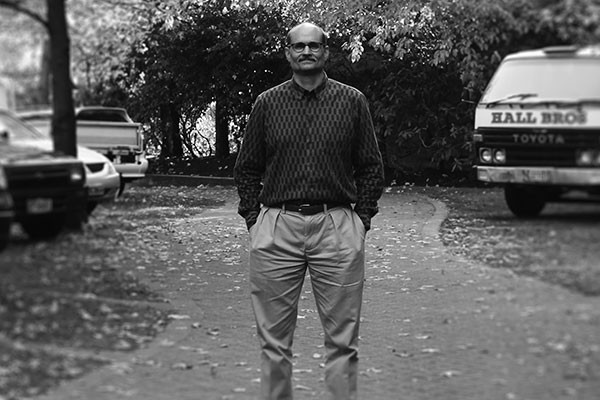When Sigurd informed me that for breakfast, he had smoked salmon bagels with cream cheese and Russian Caravan tea, I thought it summed him up perfectly.
As part of a deal for students to finish a lab by 6pm, Sigurd once promised the biochemistry class a handstand, which according to a reliable source, was executed flawlessly. Of course, nothing less is to be expected from the ex-president of the Harvard University Gymnastics Club. Now, Sigurd bikes sixteen kilometers a day to and from work on a track bike, and experiments occasionally with watercolor painting and drypoint printing.
A long way from home, Sigurd grew up in Berkeley, California, which at the time of his childhood was the epicenter and genesis of student protests of the Free Speech Movement. He recalls his older brothers being allowed to go down to watch the riots and while too young to go himself, one of his babysitters was Mario Savio, a leader of the Free Speech Movement.
After completing an undergraduate degree in Classics at Harvard, he then spent the next two years working as a lab technician for Harvard Biology Professor Lawrence Bogorad. Post Harvard, Sigurd dived back into the academic world to complete a PhD at the University of California at Berkeley and finally undertook his post doctorate at Stanford University for six years.
Sigurd had never heard of Otago till he saw an advertisement recruiting for lecturers in the journal Nature. After turning down a biotech job in the San Francisco Bay Area, and arriving picturesquely in the middle of the cold Dunedin winter of ’98, he has been part of the Biochemistry Department for 18 years.
Sigurd’s own philosophy toward education is that of a liberal one. While it seems unorthodox that he studied Classics, a liberal education meant he was encouraged to explore another subject to an appropriate depth at the same time. He chose Biochemistry, which for Sigurd, is just one of the ways in which a “fundamental explanation” is offered of life. He admits that while specialization is necessary to achieve a deep understanding, “you need a number of different perspectives to balance that understanding.”
“Different disciplines” he says, “aren’t just different because they’re looking at different things, but because of how they organize knowledge and the structure with which they perform their analysis and criticism. This gives you an appreciation that there are other equally valid, and completely distinct ways of organizing knowledge.”
With a strong commitment to social democracy, Sigurd observes that there are pressures to make the University more careers orientated than broadly education orientated. These pressures are “the combination of economic models amongst some politicians that think everything needs to be quantifiable by money, and imposing debt on students, [thus] making employability very important to the student in terms of evaluating whether their university experience is worthwhile.”
The world of scientific publications can mean that making a discovery first will lead to a high impact publication, but the discovery may sometimes lack the answer that hits the nail on the head. To this, Sigurd reflects that he has been fortunate to work with advisors that have taught him the balance between having ambition, and doing “really solid science that will stand the test of time, even if it costs you getting there first.”
Another influence from Sigurd’s advisors was the principle of “humanely treating the people you work with” which in any competitive field, may be a problem. We see this principle manifested through the comments of India Alexander, a third year student in his biochemistry lab who describes Sigurd as an ‘original hipster’ says, “he is patient to the pace of others and treats everyone with respect. We are lucky to have him.”
And indeed, we truly are.
Critic's column offers a few discussion points for when trying to blow smoke up your lecturer’s ass.
Got a lecturer you want to know about, write us at: critic@critic.co.nz






